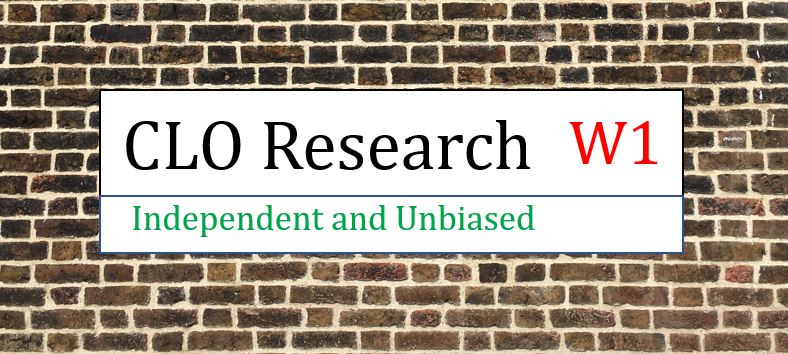During the 2008 financial crisis, senior CLO tranches demonstrated very high resilience and weathered the storm well. At the height of the crisis, CLO AAA was trading in the 60s and AA in the 20s. Rating agencies subsequently revised their rating methodologies which resulted in more credit support at the senior levels in today’s post-2008-crisis CLO deals.
Some market observers might have mixed up ABS CDOs (where the underlying RMBS collateral pool was close to maybe 100% default correlation) with CLOs and hence classified them as hazardous assets.
Unlike ABS CDO, CLO collateral pool is always very well diversified across many real businesses in various industries. A typical underlying CLO underlying portfolio is comprised of a diverse pool of syndicated bank loans (provided to non-investment grade companies). Some of these companies have a quality business profile, but they are non-investment grade because of their aggressive financial profile.
Default correlations between industries have been very low. Even within the same industry, it would not be too high as some companies would benefit when their competitors’ businesses collapsed. Across credit cycles, we have not seen default contagion across many industries. Typically, only a handful of industries would be badly hit in each downturn.
Could this time be different? Let’s do a quick senior CLO tranche health check…
According to Moody’s, industries tied to travel and discretionary spending have the highest Covid-19 exposure; they are as follows:
- Apparel
- Automotive Manufacturers
- Automotive Suppliers
- Consumer Durables
- Gaming
- Lodging/Leisure& Tourism (inc. Cruise Lines)
- Retail (non-food)
- Global Shipping
In addition, these industries have moderate exposure:
- Beverages
- Chemicals
- Manufacturing
- Media
- Metals & Mining
- Oil & Gas/Oilfield Services
- Protein & Agriculture
- Services Companies
- Steel Producers
- Technology Hardware
At the senior levels, one of the most significant risks is always widespread contagion. The health of highly-rated senior CLO tranches would be impacted this time in terms of ratings downgrade if the global health crisis cannot be contained quickly enough, policies are not effective enough, and confidence is slow to return.
Moody’s just revised its speculative-grade default rate to 16.1% under conditions similar to the global financial crisis. In an extremely severe recession, it would rise to 20.8%.
Default correlation could be higher this time than modelled between and within (between speculative-grade companies in particular) industries. While it is a remote chance now, we do not rule out a change in CLO rating methodology in the future.
Disclaimers
The information, research, data, research related opinions, observations and estimates contained in this document have been compiled or arrived at by CLO Research Group, based upon sources believed to be reliable and accurate, and in good faith, but in each case without further investigation. None of CLO Research Group or its service providers, their directors or authorised personnel make any expressed or implied presentation or warranty, nor do any of such persons accept any responsibility or liability as to the accuracy, timeliness, completeness or correctness of such sources and of the information, research, data, research related opinions, observations and estimates contained in this document. All information, research, data, research related opinions, observations and estimates contained in this document are in draft form as at the date of this document and remain subject to change and amendment without notice. Neither CLO Research Group nor any of their third-party providers shall be subject to any damages or liability for any errors, omissions, incompleteness or incorrectness of this document. This article is not and should not be construed as an offer, or a solicitation of an offer, to buy or sell securities and shall not be relied upon as a promise or representation regarding the historic or current position or performance of any of the deals or issues mentioned in it.










